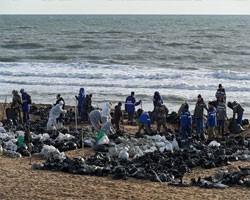TSPSC Current Affairs
| International Relations |
|---|
|
|
|
సందర్భం
పర్యావరణ సంబంధిత తీవ్ర సంక్షోభంలో, రష్యా బ్లాక్ సీ తీరంలో ఘోరమైన నూనె చిలకలపై ఫెడరల్ స్థాయి అత్యవసర పరిస్థితిని ప్రకటించింది. తుఫాను సమయంలో నష్టపరిచిన నూనె ట్యాంకర్ల కారణంగా ఈ చిలకలు ఏర్పడి, సముద్ర జీవవైవిధ్యం, తీర ప్రాంత సమాజాలు, మరియు తీర ఆర్థిక వ్యవస్థపై తీవ్ర ప్రభావం చూపింది. విపత్తు యొక్క కాలక్రమం చిలకల సంఘటన: డిసెంబర్ 15న, కేర్చి స్ర్టైట్ సమీపంలో తుఫాను కారణంగా రెండు రష్యన్-పతాక నూనె ట్యాంకర్లు నష్టపడ్డాయి. వేల టన్నుల మజుట్ (భారీ ఇంధన నూనె) బ్లాక్ సీకి లీకై, 55 కి.మీ. (34 మైళ్ళ) తీరప్రాంతాన్ని కలుషితం చేసింది. సంక్షోభం యొక్క తీవ్రతరం: స్థానిక అధికారుల ప్రారంభ శుభ్రపరిచే ప్రయత్నాలు తగినవి కాకపోవడంతో, క్రాస్నోడార్ ప్రాంతం ప్రాంతీయ అత్యవసర పరిస్థితిని ప్రకటించింది. వేలాది మంది స్వచ్ఛంద సేవకులు శుభ్రపరిచే పనిలో పాల్గొన్నప్పటికీ, కలుషిత స్థాయి ఫెడరల్ స్థాయి జోక్యాన్ని అవసరం చేసుకుంది. ఫెడరల్ స్థాయి అత్యవసర పరిస్థితి: డిసెంబర్ 21న, రష్యా అత్యవసర పరిస్థితుల మంత్రి అలెగ్జాండర్ కురెన్కోవ్ ఫెడరల్ స్థాయి అత్యవసర పరిస్థితిని ప్రకటించి, శుభ్రపరిచే కార్యక్రమాలను ముమ్మరం చేయడానికి నిధులు మరియు వనరులను కేటాయించారు. పర్యావరణ ప్రభావం కాలుష్యం యొక్క వ్యాప్తి: బ్లాక్ సీ తీరప్రాంతంలోని 200,000 టన్నుల మట్టిని భారీ ఇంధన నూనె కలుషితం చేసింది. ఈ చిలకల వల్ల సముద్ర జీవ వైవిధ్యం మరియు పర్యావరణ వ్యవస్థలకు తీవ్రమైన నష్టం కలిగింది. ప్రభావిత సముదాయాలు: తీరప్రాంతాలు అధిక నూనె కాలుష్యానికి గురవడంతో, పర్యాటక ఆధారిత ఆర్థిక వ్యవస్థలు ప్రభావితమయ్యాయి. తీర ప్రాంతాలు మరియు జలాలు రాబోయే వసంత మరియు గ్రీష్మ కాలాల్లో అనారోగ్యకరంగా ఉండవచ్చు, దీర్ఘకాల ఆర్థిక ప్రభావాలకు దారి తీస్తుంది. ప్రభుత్వ స్పందన అత్యవసర చర్యలు: ఫెడరల్ అత్యవసర పరిస్థితి ద్వారా: ఫెడరల్ బడ్జెట్ నుండి వనరులను సమీకరించడం. ప్రత్యేకమైన పరికరాలు మరియు సిబ్బందిని మోహరించడం. శుభ్రపరిచే పనులను వేగవంతం చేయడానికి స్థానిక, ప్రాంతీయ, మరియు ఫెడరల్ సంస్థల మధ్య సమన్వయం చేయడం. ప్రారంభ ప్రయత్నాలపై విమర్శలు: స్థానిక నివాసితులు మొదటి స్పందనను అసమర్థమైనది మరియు తగిన వనరులు లేనిదిగా పేర్కొన్నారు, దీని వల్ల విపత్తు ప్రభావం మరింత పెరిగింది. నిపుణుల హెచ్చరికలు పర్యావరణ ప్రభావం: మట్టిలో మరియు నీటిలో దీర్ఘకాల కాలుష్యం ఈ ప్రాంతాన్ని మానవులు మరియు వన్యప్రాణుల నివాసానికి అనర్హంగా మార్చవచ్చు. సముద్ర జీవం మరియు పర్యావరణ వ్యవస్థలకు తిరిగిరాని నష్టం కలగవచ్చు. ఆర్థిక ప్రభావం: తీర ప్రాంత పర్యాటక రంగం, ప్రధాన ఆర్థిక వనరుగా, పెద్ద ఎత్తున నష్టాలను ఎదుర్కొనవచ్చు. బీచ్లు కలుషితంగా ఉండడం వల్ల పర్యాటకులు రావడానికి నిరుత్సాహం చెందుతారు. ముందున్న సవాళ్లు శుభ్రపరిచే పనులు: మజుట్ వంటి భారీ ఇంధన నూనెను తొలగించడం అత్యాధునిక సాంకేతికత మరియు నైపుణ్యాన్ని అవసరం చేస్తుంది. అత్యవసర సిబ్బంది మరియు స్వచ్ఛంద సేవకులు విషతుల్య పదార్ధాలతో పొడవు కాలం పనిచేయడం వల్ల ఆరోగ్య సమస్యలు ఎదుర్కొంటారు. పర్యావరణ పునరుద్ధరణ: సముద్ర మరియు తీర ప్రాంత పర్యావరణ వ్యవస్థల పునరుద్ధరణ కోసం దీర్ఘకాల ప్రణాళికలు అవసరం. పునరుద్ధరణను పర్యవేక్షించడం మరియు భవిష్యత్తులో ఇలాంటి చిలకల నివారణకు చర్యలు అమలు చేయడం అత్యవసరం. ముగింపు బ్లాక్ సీ నూనె చిలకలు, నూనె రవాణాతో సంబంధించి పర్యావరణ మరియు ఆర్థికపరమైన ప్రమాదాలకు ఒక గుణపాఠం. రష్యా ఫెడరల్ స్థాయి స్పందన, ఇలాంటి విపత్తులను అధిగమించడానికి ఆధునిక సాంకేతికత మరియు సమన్వయంతో కూడిన ప్రయత్నాల ఆవశ్యకతను హైలైట్ చేస్తుంది. పర్యావరణ వ్యవస్థల పునరుద్ధరణ మరియు సమాజ జీవనోపాధుల పునర్నిర్మాణానికి దీర్ఘకాలిక కట్టుబాటు అవసరం. మూలం: The Hindu |
|
|
|
ENGLISH
Russia Declares Federal Emergency Over Black Sea Oil SpillContextIn a severe environmental crisis, Russia has declared a federal-level emergency in response to a catastrophic oil spill along the Black Sea coast. The spill, caused by damaged oil tankers during a storm, has led to widespread pollution, affecting marine ecosystems, local communities, and the coastal economy. Timeline of the Disaster The Spill Incident: On December 15, two Russian-flagged oil tankers were damaged near the Kerch Strait during a storm. Thousands of tons of heavy fuel oil (mazut) spilled into the Black Sea, polluting 55 kilometers (34 miles) of coastline. Escalation of the Crisis: Initial cleanup efforts by local authorities were inadequate, prompting the Krasnodar region to declare a regional state of emergency. Thousands of volunteers joined the cleanup, but the scale of pollution required federal intervention. Federal-Level Emergency Declared: On December 21, Russia’s Emergency Situations Minister, Alexander Kurenkov, declared a federal-level emergency to allocate resources and funds for intensified cleanup operations. Environmental Impact Extent of Pollution: 200,000 tons of soil along the Black Sea coast have been contaminated with heavy fuel oil. The spill has caused severe damage to marine life and ecosystems. Affected Communities: Coastal areas face high levels of oil pollution, impacting tourism-dependent economies. Beaches and waters may remain unsafe, deterring tourists during spring and summer seasons, leading to long-term economic consequences. Government Response Emergency Measures: Federal emergency declaration allows: Mobilization of resources from the federal budget. Deployment of specialized equipment and personnel. Coordination between local, regional, and federal agencies to expedite cleanup. Criticism of Initial Efforts: Local residents criticized the response as disorganized and under-resourced, exacerbating the disaster’s impact. Expert Warnings Environmental Impact: Long-term contamination of soil and water could render the region uninhabitable for humans and wildlife. Marine life and ecosystems may suffer irreversible damage. Economic Repercussions: Tourism, a key economic driver for the region, may suffer significant losses as beaches remain polluted. Challenges Ahead Cleanup Operations: Removing heavy fuel oil like mazut requires advanced technology and expertise. Emergency workers and volunteers face health risks due to prolonged exposure to toxic substances. Restoration of Ecosystems: Long-term rehabilitation of marine and coastal ecosystems is essential. Monitoring and research will be necessary to track recovery and implement preventive measures. Conclusion The Black Sea oil spill is a stark reminder of the environmental and economic risks associated with oil transportation. Russia’s federal-level response underscores the urgency of addressing such crises with advanced technologies and coordinated efforts. Restoring ecosystems and rebuilding community livelihoods will require sustained commitment and international expertise. Source: The Hindu |
| >> More TSPSC Current Affairs |
